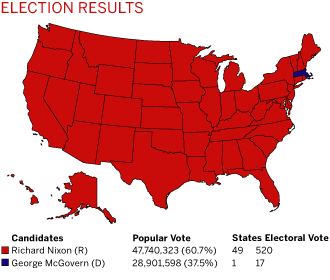In 1971, President Nixon’s approval rating fell below 50 percent. Despite his 1968 promises to end the Vietnam War, the conflict was dragging on. At home, inflation and unemployment were rising. Nixon restored his popularity through several actions: he took unprecedented diplomatic trips to China and Russia; stepped up efforts to end the war by ordering the bombing of Hanoi; instituted wage and price controls; and ended the draft, partly because of the recent lowering of the voting age from 21 to 18. Nixon’s opponent, South Dakota Senator George McGovern, who won his party’s nomination with a grassroots campaign sparked by the antiwar movement, called for withdrawal from Vietnam and a significant reduction in military spending. McGovern named as his running mate Missouri Senator Thomas Eagleton, who, shortly after the convention, revealed that he had been hospitalized for depression and had received shock therapy. McGovern dropped him from the ticket and replaced him with former ambassador R. Sargent Shriver. The incident created an impression of ineptitude. McGovern was also unable to convince the public of any connection between the Nixon administration and the June break-in at the Democratic National Committee headquarters in the Watergate apartment complex.
Republican
Richard Nixon for president
Spiro Agnew for vice president
"President Nixon. Now More Than Ever"
No incumbent president has used television advertising more effectively than Richard Nixon in 1972. His ad campaign was a two-pronged attack depicting Nixon as a successful world leader and McGovern as a reckless liberal. Nixon’s positive ads used documentary techniques to give voters a glimpse inside the White House, with scenes of Nixon at state dinners, in meetings with world leaders, and at work in the Oval Office. The documentary style gave the spots a feeling of intimacy and authenticity, and created the impression that voters were getting a privileged view. The ads also attempted to humanize Nixon, who was widely perceived as cold and humorless, by showing him in relaxed moments playing the piano for Duke Ellington, dancing with his daughter at her wedding, and joking with Chinese translators.
Nixon’s most effective commercials, however, were attack ads. One spot ridiculed McGovern’s proposed defense cuts by using the stark image of a hand sweeping away toy soldiers, planes, and warships. Another claimed that McGovern would put 47 percent of the country on welfare. Though created by the Republican campaign, these ads were credited to "Democrats for Nixon," a strategy meant to create the impression that McGovern’s liberal views put him outside the mainstream of his own party.
Nixon’s ads were produced by the November Group, a virtual all-star team of advertising executives headed by Peter Dailey, who ran his own Los Angeles agency, Phil Joanou from Doyle Dane Bernbach, William Taylor from Ogilvy and Mather, and an advisory board of executives from many top agencies.
Democrat
George McGovern for president
Sargent Shriver for vice president
"McGovern. Democrat. For the People"
The style of McGovern’s ads reflected the populist nature of his campaign. The candidate was filmed in informal encounters with voters in factories, meeting halls, hospitals, and senior-citizen centers. The spots were produced by Charles Guggenheim, the documentary filmmaker who had made many of Adlai Stevenson’s ads in 1956. In his commercials for McGovern, Guggenheim used cinéma vérité techniques. Photographed with a handheld camera and portable sound equipment, the ads were designed to look casual and spontaneous in deliberate contrast with the stately aura surrounding Nixon’s presidency. The ads succeeded in portraying McGovern as compassionate, but they did not make him look presidential.
McGovern had wanted to avoid negative ads, but he changed his mind late in the campaign in reaction to his poor standing in the polls. The attack ads against Nixon were delivered with a "crawl" of white text against a black background. This stark presentation of claims in a seemingly neutral style is now a common technique in political and product advertising.
